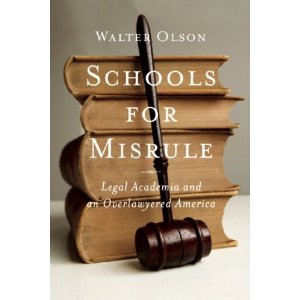That could be the result of the new institution of elaborate compliance system mandates that could prove to be beyond the capacity of fledgling start-ups, per Marc Hodak:
So, the government decided it had to increase regulations [on] the one part of the financial services sector -– hedge funds –- that had nothing to do with the financial crisis. And because the government felt compelled to spend gobs of taxpayer cash to bail out financial institution[s] that were too big to fail, Congress created a raft of regulations whose main effect will be to crush entrepreneurship and compel waves of consolidation. And the people who pushed for this regulation, who inadvertently insisted that the fixed costs of doing business in America are not yet high enough, will be shocked to find that only the big survive.

 favorite reviews so far; among its other virtues, it gets into the conflicting institutional pressures on law schools that underlie some of the ideological drift. For other reviews, see our posts
favorite reviews so far; among its other virtues, it gets into the conflicting institutional pressures on law schools that underlie some of the ideological drift. For other reviews, see our posts